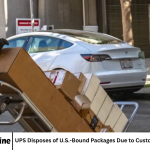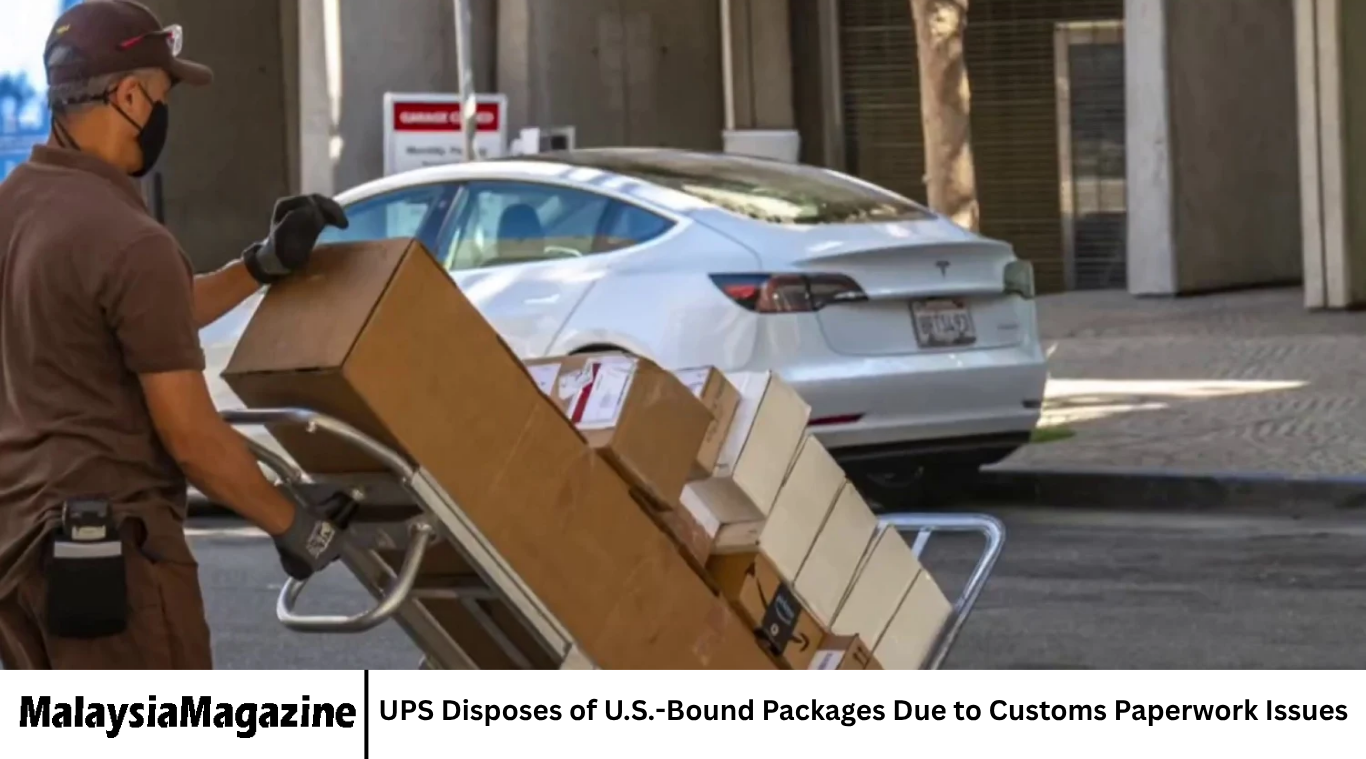United Parcel Service (UPS) has begun disposing of or returning thousands of international packages destined for the United States due to customs paperwork problems. The decision has caused widespread frustration among businesses and individual senders around the world, many of whom have reported delays, lost parcels, and unexpected costs.
The issue stems from incomplete or inaccurate customs declarations required for entry into the U.S. Since American customs laws have become stricter in recent years, carriers like UPS are under increasing pressure to ensure that all imported goods meet legal and regulatory requirements before crossing the border. When this paperwork is missing or incorrect, shipments can be rejected, delayed, or even destroyed.
This article examines the reasons behind UPS’s move, the scale of the problem, how it affects global trade, and what customers can do to avoid similar issues in the future.
Why UPS Is Disposing of Packages
UPS, one of the largest logistics companies in the world, handles millions of parcels daily across international borders. Each package entering the United States must be accompanied by complete and accurate customs documents, including detailed descriptions, values, and the country of origin.
Recently, the U.S. Customs and Border Protection (CBP) agency has tightened enforcement of these rules to prevent illegal imports, fraud, and mislabeling of goods. As a result, UPS has had to apply stricter internal checks to comply with the law.
When packages arrive at sorting centers without proper documentation or with incorrect data, UPS must decide whether to hold, return, or dispose of them. In many cases, returning the parcel to the sender is not feasible because of incomplete sender details, high costs, or local regulations. Therefore, disposal becomes the last option.
Growing Regulatory Pressure
The tightening of customs regulations is not new, but enforcement has become much more aggressive since the pandemic and the rise of e-commerce. The U.S. government has been increasing scrutiny of imports to combat issues like counterfeit goods, undervalued shipments, and illegal trade.
In particular, the “de minimis” import rule — which allows low-value items to enter the U.S. duty-free — has drawn attention. Many small exporters have been accused of misusing this rule by underreporting the value of goods to avoid taxes. This has led to stricter inspection and documentation requirements for all carriers.
UPS, as a licensed customs broker, must ensure compliance with every shipment. Failure to do so could result in penalties, fines, or even suspension of shipping privileges. To avoid such risks, the company has chosen to take a firm stance on non-compliant shipments.
Impact on Businesses and Consumers
The sudden disposal of packages has created significant challenges for both businesses and individuals. Small exporters, especially from Asia and Europe, have been among the hardest hit. Many rely on UPS to deliver products to American customers, and now face financial losses when their goods are destroyed or returned.
Customers in the U.S. have also been affected, with many reporting missing deliveries or incomplete tracking updates. The confusion has led to frustration, as people are often unaware that their packages were held up or discarded due to missing paperwork.
Some small businesses have had to refund customers or reship items at their own expense. The issue highlights how critical accurate customs documentation has become in international commerce.
What Kind of Packages Are Affected
According to logistics experts, the majority of affected packages fall into a few common categories. These include low-cost e-commerce shipments, handmade goods, and small commercial samples. In many cases, sellers failed to provide a proper description of the contents or undervalued the shipment to reduce customs duties.
Common problems include missing commercial invoices, vague product descriptions like “gift” or “sample,” and inaccurate tariff codes. Packages with unclear values or incomplete sender information are also at risk of being rejected or destroyed.
Shipments from regions where e-commerce platforms have grown rapidly — such as China, India, and parts of Europe — appear to be particularly vulnerable due to the high volume of small-scale exports.
UPS’s Official Response
UPS has acknowledged the issue and stated that it is acting in compliance with international trade laws and customs regulations. The company emphasized that it cannot deliver packages that fail to meet the documentation standards set by U.S. authorities.
A spokesperson explained that UPS makes every reasonable effort to contact shippers or recipients before disposing of packages. However, in cases where communication is impossible or responses are delayed, disposal becomes the only practical option.
The company has also urged customers to familiarize themselves with customs requirements and ensure that all necessary forms are completed before shipping.
Reactions from the Public
Reactions to the move have been mixed. Many affected customers have expressed anger on social media, accusing UPS of acting too harshly and not providing clear guidance. Some have complained that they were not given enough time to fix the paperwork before their parcels were destroyed.
On the other hand, trade experts argue that UPS had little choice. They point out that customs laws are non-negotiable and that carriers can face serious consequences for delivering goods with incomplete documentation.
Logistics analysts believe that the backlash could push UPS and other shipping companies to invest in better digital systems for verifying customs data before parcels are dispatched.
Broader Implications for Global Trade
The issue also highlights the growing complexity of international trade. As e-commerce expands, millions of small parcels cross borders daily, creating challenges for customs authorities trying to monitor and regulate them.
The U.S. government’s stricter stance is part of a broader global trend. Countries in Europe and Asia are also tightening import rules, focusing on accurate data reporting, tax compliance, and product safety.
For logistics companies like UPS, the challenge lies in balancing fast delivery with legal compliance. The disposal of non-compliant packages shows how fragile global supply chains can become when paperwork is overlooked.
How Shippers Can Avoid Problems
Experts recommend several practical steps to prevent shipments from being destroyed or delayed. Every package entering the U.S. must include a complete commercial invoice, the correct Harmonized System (HS) code, and the true value of the goods.
Sellers should avoid vague descriptions and clearly state the purpose of the shipment, whether it is for sale, a gift, or a sample. Additionally, it is crucial to include accurate sender and receiver details to allow communication in case of issues.
Many shipping platforms now offer online tools that automatically generate the necessary documents, making compliance easier. Businesses that frequently ship to the U.S. can also use customs brokerage services to ensure accuracy and prevent costly mistakes.
The Role of Technology in Customs Compliance
Technology can play a major role in reducing such problems. Advanced shipping software can check for missing data, validate tariff codes, and ensure that descriptions meet customs standards.
UPS and other major logistics providers are increasingly using automation and artificial intelligence to detect potential compliance issues before packages are shipped. These systems can alert customers if required fields are incomplete, preventing errors at the source.
However, smaller exporters who rely on manual processes are still vulnerable to mistakes. For them, training and awareness are essential to navigating the complex customs landscape.
Possible Economic Effects
The disruption caused by the disposal of U.S.-bound packages could have minor but noticeable effects on small exporters, particularly in developing markets. Businesses that depend on American buyers for online sales may face revenue drops or damage to their reputations.
In the long term, stricter enforcement could encourage more compliance and transparency in global shipping, leading to fairer competition and reduced smuggling. However, it may also raise costs for small businesses that lack the resources to handle complex documentation.
Trade associations have called for better communication between carriers, customs authorities, and exporters to minimize such disruptions in the future.
Looking Ahead
As global trade continues to evolve, customs enforcement will likely become even more stringent. Governments are determined to improve oversight of imports, protect consumers, and ensure tax compliance.
UPS’s decision to dispose of non-compliant packages sends a clear message that international shipping is no longer a simple process. It requires full cooperation between senders, carriers, and regulators.
To prevent future disruptions, logistics companies are expected to introduce more transparent digital tools and clearer customer guidelines. Businesses, in turn, must adapt to new realities by investing time and effort into proper documentation.
Frequently Asked Questions
Why is UPS disposing of packages?
UPS is disposing of packages that lack proper customs paperwork or contain incorrect information to comply with U.S. import laws.
Can senders recover their disposed packages?
Once a package is disposed of due to non-compliance, recovery is typically not possible. UPS may contact the sender before disposal, but if there is no response, the process proceeds.
What kind of paperwork is required for U.S. shipments?
Shipments to the U.S. require a complete commercial invoice, accurate product description, declared value, HS code, and full sender and receiver details.
How can businesses prevent such issues?
Businesses can avoid problems by double-checking documentation, using automated customs forms, and ensuring transparency in product descriptions and values.
Are other courier companies facing similar issues?
Yes, other carriers such as FedEx and DHL also enforce strict compliance with customs laws and may reject or return non-compliant packages.
Is this a new policy by UPS?
It is not entirely new, but enforcement has become stricter in response to tighter U.S. customs regulations and increased global oversight.
Does this affect only certain countries?
The issue affects international shipments from many countries, particularly where e-commerce is growing rapidly and documentation errors are common.
What should customers do if their package is missing?
Customers should contact UPS with their tracking number to determine the status of their shipment and request information about possible documentation issues.
Conclusion
The situation involving UPS and U.S.-bound packages underscores the importance of accuracy in international shipping. With customs authorities tightening their rules, even small mistakes in paperwork can lead to serious consequences, including the loss of goods.
While the move has caused frustration among customers, it reflects a broader global shift toward stricter compliance and accountability in trade. As carriers and businesses adjust, the lessons learned from this episode will help shape a more transparent and reliable global shipping system.














